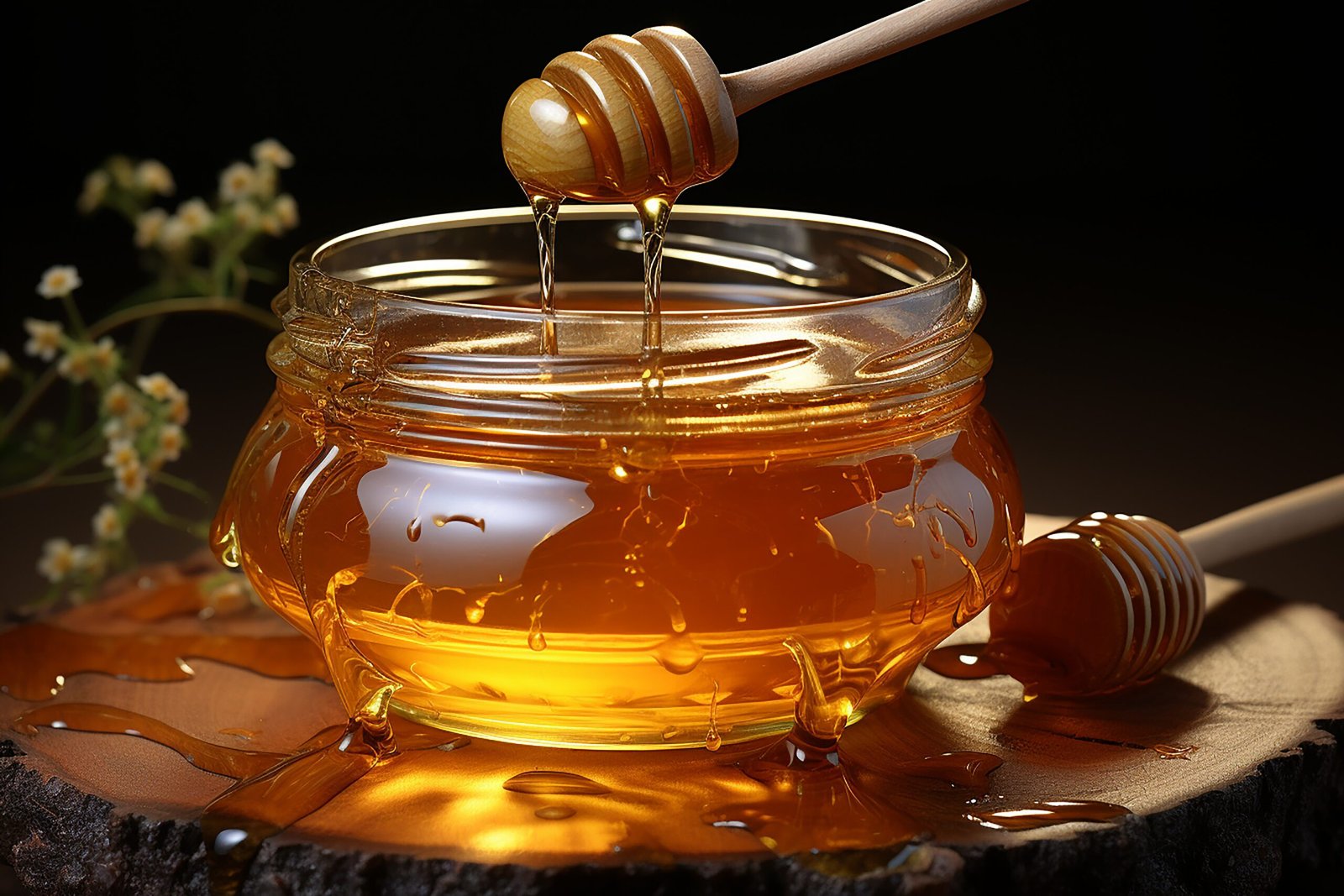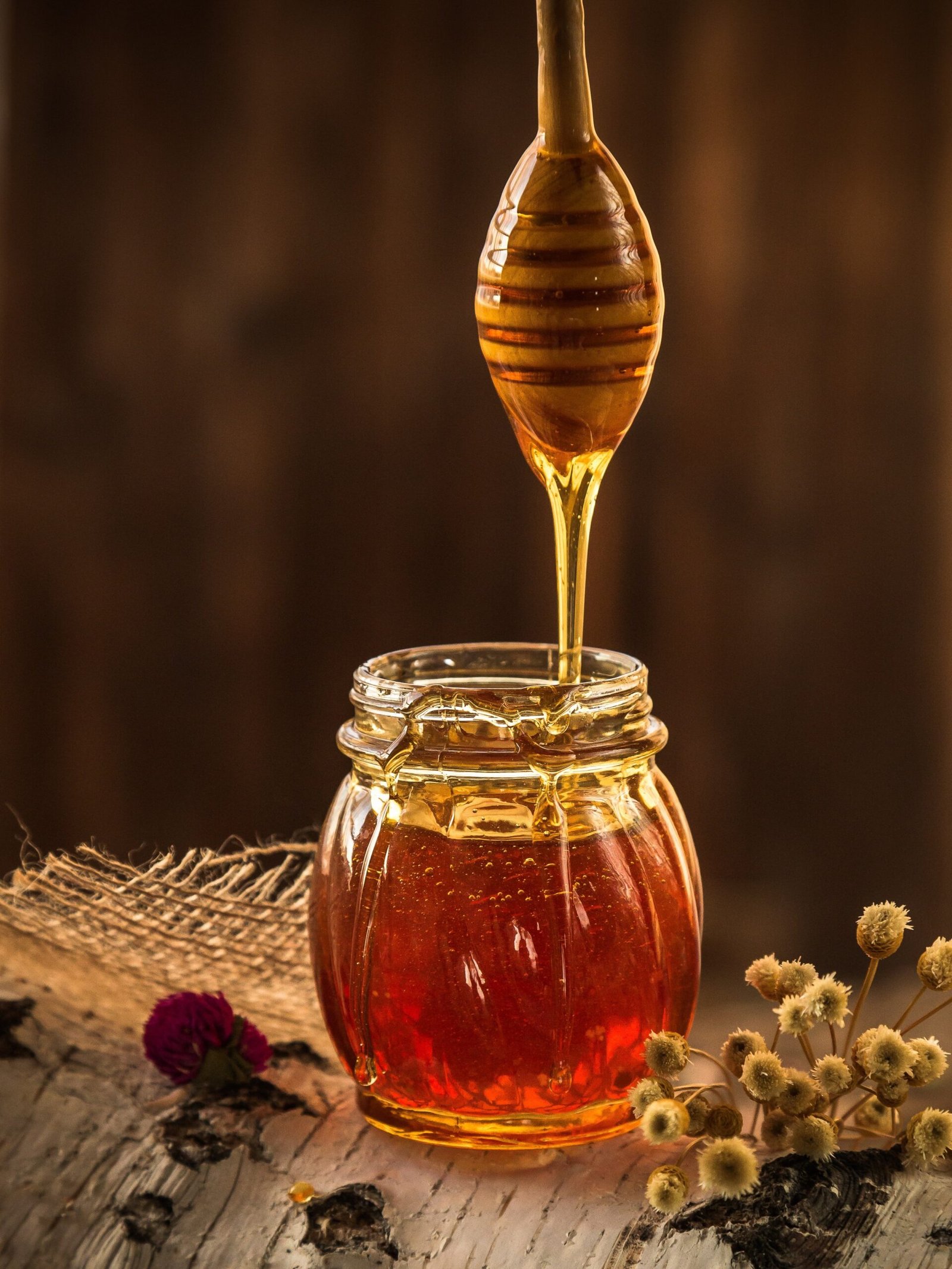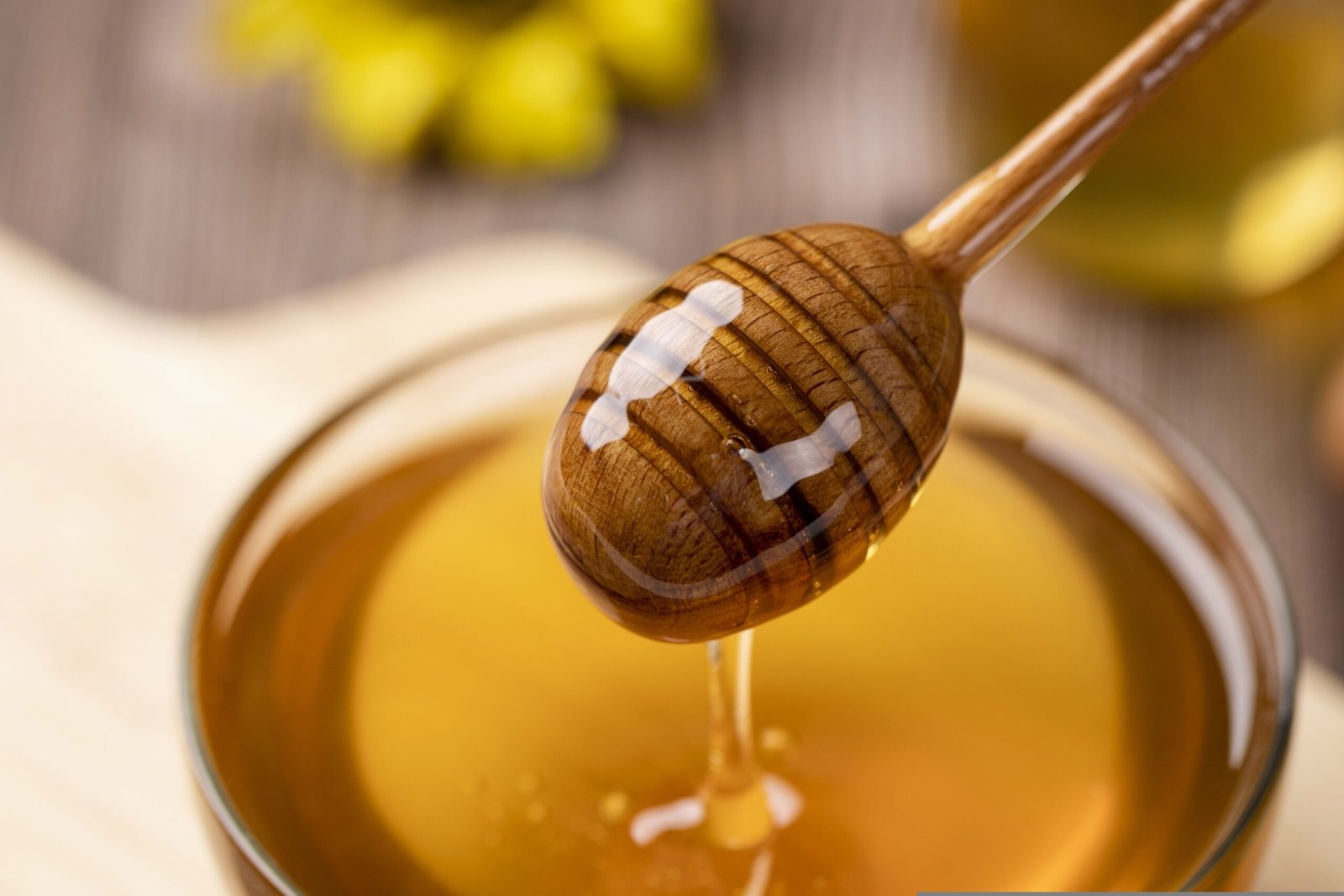Introduction to Honey
Honey, a golden liquid renowned for its sweetness and therapeutic properties, is a remarkable creation of bees. The production process involves bees collecting nectar from flowers, which is then enzymatically transformed and concentrated within the hive to produce honey. This natural sweetener has a storied history, dating back thousands of years, having been utilized not only as a food source but also for its medicinal benefits.
Across various cultures, honey has held significant value. Ancient Egyptians, for instance, relied on it for both culinary and medicinal purposes, using it in everything from mead to ointments. Similarly, Ayurveda and Traditional Chinese Medicine have long embraced the diverse benefits of honey, acknowledging its role in promoting health and wellness.
What sets honey apart from other sweeteners is its unique composition. Unlike refined sugars, honey contains a multitude of beneficial compounds, including antioxidants, vitamins, minerals, and amino acids. Its antimicrobial properties can be attributed to the presence of hydrogen peroxide and low pH, making it a favored remedy for wounds and infections. Additionally, honey’s distinct flavor profiles are influenced by the types of flowers from which the nectar is harvested, creating a wide array of tastes and colors.
Moreover, the glycemic index of honey is typically lower than that of table sugar, which results in a slower and more steady release of energy. This aspect, combined with its natural composition, suggests potential advantages for those looking to manage their blood sugar levels more effectively. As interest in natural and holistic health solutions grows, the practice of eating honey regularly has garnered renewed attention for its beneficial properties and multifaceted applications.
Nutritional Profile of Honey
Honey is a natural sweetener that packs a remarkable range of nutritional components. It contains essential vitamins such as B6, thiamin, niacin, riboflavin, and pantothenic acid, which play crucial roles in energy production and maintaining metabolic health. In addition to these vitamins, honey also provides a variety of minerals including calcium, iron, magnesium, potassium, and zinc, which are vital for supporting bone health, enhancing muscle function, and maintaining robust immune defenses.
Moreover, honey is rich in enzymes like amylase, invertase, and glucose oxidase, which not only aid in the digestive process but also contribute to its antimicrobial properties. These enzymes play a role in breaking down complex sugars into simpler forms, making it easier for the body to absorb and utilize them as a quick source of energy.
Additionally, honey’s antioxidant content is significant, featuring phenolic compounds and flavonoids that help to protect the body from oxidative stress. These antioxidants combat free radicals, potentially reducing the risk of chronic diseases such as heart disease and cancer. Regular consumption of honey can thus contribute to better cellular health and longevity.
However, it is important to be mindful of honey’s caloric content. A single tablespoon of honey contains approximately 64 calories, primarily from natural sugars like glucose and fructose. While these sugars provide a readily available source of energy, excessive consumption can lead to unwanted weight gain and spikes in blood sugar levels. Therefore, moderation is key when incorporating honey into your diet.
By understanding the nutritional profile of honey, one can appreciate the multifaceted benefits of eating honey regularly. Its rich composition of vitamins, minerals, enzymes, and antioxidants makes it a valuable addition to a balanced diet, promoting overall health when consumed in appropriate amounts.

Honey as a Natural Energy Booster
Honey serves as a remarkable natural energy booster, owing to its unique composition of simple natural sugars, primarily glucose and fructose. These sugars are absorbed directly into the bloodstream, providing an immediate source of energy. For athletes and individuals engaged in high-intensity activities, honey offers both a quick lift and sustained energy levels, making it an optimal choice for maintaining peak performance.
Glucose in honey is rapidly absorbed by the body, delivering an instant energy spike. On the other hand, fructose is metabolized more slowly, ensuring a prolonged release of energy. This dual-action mechanism is particularly beneficial for athletes, as it helps prevent the energy crashes commonly associated with other carbohydrate sources. Consuming honey before or after workouts can significantly enhance performance and recovery. Before exercising, honey can be taken to energize muscles, whereas post-exercise consumption replenishes glycogen stores and accelerates muscle recovery.
Moreover, honey’s antioxidant properties support overall well-being by combating oxidative stress and reducing inflammation, both of which are pertinent to athletes dealing with intense physical exertion. Additionally, honey provides trace amounts of vitamins and minerals, contributing to overall bodily function and health. Its natural composition makes it an excellent alternative to synthetic energy gels and sports drinks that may contain artificial additives and preservatives.
Integrating honey into daily routines requires minimal effort. A spoonful added to herbal tea, smoothies, or simply taken on its own can suffice for a convenient energy boost. For those involved in endurance sports, honey packets can serve as handy fuel sources during long events. The sustained energy release and rapid absorption characteristics make eating honey regularly an effective strategy for anyone seeking a natural, efficient way to maintain energy levels. Thus, understanding the role of honey not only underscores its sweet taste but also its profound benefits as a natural source of energy.
Honey’s Role in Digestive Health
Honey has long been revered not only for its sweet, delectable taste but also for its multifaceted health benefits. Among these, its significant impact on digestive health stands out. One of the primary advantages is honey’s prebiotic properties, which foster the growth of beneficial bacteria in the gut. These prebiotics act as food for probiotics— the good bacteria essential for maintaining a balanced gut microbiome. By promoting the proliferation of these beneficial bacteria, honey aids in preserving a healthy digestive environment.
Additionally, honey can be a natural remedy for alleviating various digestive issues. For individuals suffering from ulcers, gastritis, or indigestion, honey serves as a soothing agent. Its anti-inflammatory and antibacterial properties help in calming the lining of the stomach and intestines, thereby reducing sensations of discomfort and pain. The consistent intake of honey has also been linked to the reduction of Helicobacter pylori infection, a common cause of stomach ulcers.
Moreover, the enzymes present in honey play a crucial role in supporting digestion. These enzymes, such as amylase and invertase, facilitate the breakdown of complex sugars and starches into simpler, more easily absorbed molecules. This enzymatic activity ensures that the nutrients from the food consumed are efficiently absorbed and utilized by the body. In essence, incorporating honey into one’s diet can enhance the digestive process, leading to improved overall digestive function.
By consuming honey regularly, individuals can reap substantial benefits for their digestive health. Its prebiotic properties, soothing effects on digestive ailments, and enzyme-rich composition collectively make honey a remarkable natural substance for supporting and maintaining optimal digestive health.

Antioxidant and Anti-Inflammatory Benefits
Honey is well-regarded for its potent antioxidant properties, which play a crucial role in safeguarding the body against the damaging effects of free radicals. These unstable molecules can cause cellular damage, leading to aging and various health conditions. The antioxidants found in honey, such as flavonoids and phenolic acids, help neutralize these harmful free radicals, thereby contributing to better overall health and wellness.
Regular consumption of honey can significantly bolster the body’s defense mechanisms, thanks to these antioxidants. By mitigating oxidative stress, honey supports cellular health and reduces the risk of chronic diseases such as heart disease, cancer, and neurodegenerative disorders. The consumption of honey regularly fortifies the body’s natural resilience, promoting longevity and vitality.
In addition to its antioxidant benefits, honey is also known for its impressive anti-inflammatory properties. Chronic inflammation is at the root of many illnesses, including arthritis, cardiovascular diseases, and even depression. Honey’s anti-inflammatory compounds work by modulating the body’s inflammatory response, reducing the production of pro-inflammatory cytokines and enzymes.
Incorporating honey into your diet can help manage and ease symptoms associated with inflammation-related conditions. For instance, individuals suffering from joint pain or arthritis may find relief through the natural anti-inflammatory action of honey. Its gentle, soothing qualities also make it suitable for alleviating minor burns, wounds, and throat irritations.
Overall, the integration of honey into daily dietary habits offers a multifaceted approach to health maintenance. By leveraging its antioxidant and anti-inflammatory benefits, honey not only combats cellular damage and inflammation but also contributes to a stronger, more resilient body. Thus, eating honey regularly can be a simple yet effective means of enhancing one’s health and addressing inflammation-related issues.
Immune System Support
One of the primary benefits of eating honey regularly lies in its potent antimicrobial and antiviral properties. Honey has been utilized for centuries as a natural remedy to bolster the immune system. Its composition includes hydrogen peroxide, methylglyoxal, and polyphenols, compounds known for their ability to combat harmful microorganisms.
Consuming honey can significantly reduce the duration and severity of common ailments such as colds and sore throats. When faced with a cold, many turn to the soothing properties of honey, often mixed with warm water and lemon, to relieve throat irritation and suppress coughs. Studies have demonstrated that honey is not only effective in symptom relief but also in hastening recovery time.
Certain types of honey are particularly renowned for their immune-boosting abilities. Manuka honey, for instance, originating from New Zealand, is celebrated for its high concentration of methylglyoxal, making it exceptionally effective against bacteria and viruses. Similarly, Buckwheat honey contains robust antioxidant properties that further support immune function.
Regular consumption of honey can also act as a preventive measure against some illnesses by maintaining a balanced immune response. Including a spoonful of honey in daily diets can enhance overall well-being due to its rich array of vitamins, minerals, and enzymes. Thus, integrating honey into regular meals not only adds a touch of natural sweetness but also supports a healthier, more resilient immune system.
Honey has long been celebrated for its myriad of health benefits, and its virtues extend well into the realm of skincare. Frequently incorporated into beauty routines, honey is renowned for its antibacterial and moisturizing properties. These attributes make honey an effective ally in achieving and maintaining healthy skin.
Antibacterial and Moisturizing Properties
The antibacterial qualities of honey stem from its natural production of hydrogen peroxide, a compound that disinfects and promotes sterility. This makes honey particularly effective in treating and preventing acne, as it helps to ward off bacteria that can clog pores and cause breakouts. Additionally, honey’s humectant properties allow it to retain moisture, ensuring that skin remains hydrated. This is critical, as well-hydrated skin is less prone to irritation and dryness, contributing to a more youthful and supple appearance.

Wound Healing
Honey’s ability to aid in wound healing is well-documented. Its viscous nature creates a protective barrier over wounds, which keeps them moist and reduces the risk of infection. Furthermore, honey’s anti-inflammatory properties help to minimize swelling and discomfort while promoting faster tissue regeneration. Applying honey to cuts and abrasions can expedite the healing process and reduce the likelihood of scarring.
Acne Treatment
The benefits of eating honey regularly translate into topical applications for acne treatment as well. When applied to the skin, honey’s antibacterial properties can diminish the severity of acne outbreaks. It decomposes into components that nullify harmful bacteria while providing a gentle, non-irritating solution. This makes honey an excellent option for those with sensitive skin who may not tolerate harsh chemical treatments.
DIY Skin Treatments
For those interested in natural skincare remedies, honey serves as a versatile and effective ingredient in numerous DIY treatments. A popular option is the honey and oatmeal face mask, which combines honey’s moisturizing abilities with oatmeal’s exfoliating properties to rejuvenate the skin. Another favored treatment is the honey and lemon scrub, which uses lemon’s natural acidity to brighten the skin while honey locks in hydration. Incorporating honey into these treatments can significantly enhance skin health, making it a valuable addition to any skincare regimen.
Choosing the Right Type of Honey and Consumption Tips
Selecting the appropriate type of honey is crucial for reaping its full benefits, as not all honey varieties are created equal. When considering honey, it is essential to distinguish between raw and pasteurized honey. Raw honey is unprocessed and retains all its natural enzymes, antioxidants, and nutrients, making it the preferred choice for those looking to maximize health benefits. In contrast, pasteurized honey undergoes heat treatment, which may diminish its nutritional value.
Another key aspect to consider is the purity and origin of the honey. Opting for pure, organic honey ensures that you’re consuming a product free from pesticides, additives, and artificial ingredients. Organic honey is usually derived from bees that forage on organic flowers, providing a more wholesome and natural product. To ascertain the quality, look for certifications or labels indicating organic and pure honey.
Incorporating honey into your daily diet can be both delightful and nutritious. Here are some tips to seamlessly integrate honey into your meals and snacks:
1. **In Teas:** Adding a teaspoon of honey to your herbal or green tea can enhance the flavor while providing an extra antioxidant boost.
2. **Smoothies:** Honey is an excellent sweetener for smoothies. Its natural sweetness complements fruits and vegetables, making for a healthier, more nutritious drink.
3. **Drizzled Over Fruits:** For a simple yet delicious treat, drizzle honey over fresh fruit like apples, bananas, or berries. This not only enhances the natural sweetness but also adds a touch of luxury to your snack.
4. **Sugar Substitute:** Honey can effectively replace sugar in many recipes, offering the same sweetness with added nutritional benefits. Use it in baking, cooking, or even in sauces and dressings.
By carefully selecting high-quality honey and incorporating it thoughtfully into your diet, you can take advantage of its numerous health benefits while enjoying its natural, delightful flavor.






